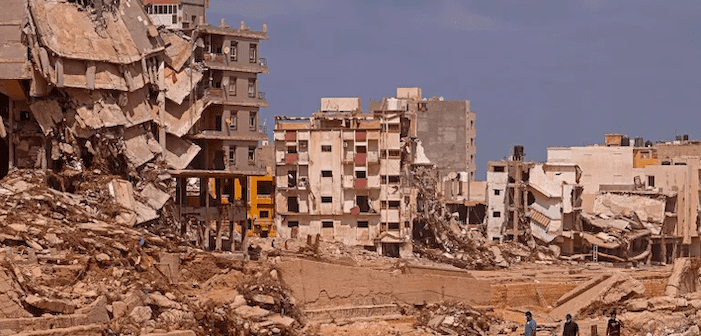Geographer and Arab world specialist Ali Bensaad attributes the deteriorating condition of the dams and the anarchic urbanization of the city, which exacerbated the cyclone’s impact, to the policies of Gaddafi.
Floods have always punctuated Derna’s history. This is why the municipality had two dams built upstream. However, the power of Cyclone Daniel was in no way comparable to even the most paroxysmal episodes the city experienced. Daniel marked Libya’s entry into the uncertain future of climate change.
But above all, it revealed the extent to which this future is heavily compromised, as is the present by explosive legacies that considerably amplified the tragedy. These are neither solely nor primarily those of the civil war that followed the fall of Gaddafi. Instead, they go back to the chaos of his reign, the echoes of which can be found in today’s chaos. And directly in the Derna disaster.
The dams, whose collapse multiplied the effects of the cyclone with the instantaneous release of millions of cubic meters of stored water, had not been inspected or maintained since 2003! In other words, almost a decade before the fall of Gaddafi. Their state of neglect for 20 years inevitably contributed to their fragility. Although the dams were no longer maintained, a budget line continued to be allocated to them each year and to be reported as completed!
Weapon of mass destruction
It illustrates a system that has made national resources proprietary and where positions of responsibility, awarded on the basis of tribal allegiances, were conceived primarily as a means of gaining access to these resources. It was a system where short-term predation, clientelist interference and populist whims affected the environment to the point of transforming it into a danger.
By the middle of the 2000s, less than 30 years after they were built, these dams were more than 50% silted up. These millions of cubic meters of silt have made the infrastructure more fragile. More importantly, they became a weapon of mass destruction, the sudden release of which has made flooding more aggressive and harmful. The muddy blanket covering the city was largely the result of this neglect.
This silting-up was due to the intense erosion of the watershed, the exploitation of which had become a power issue. In a green region of arid Libya but also an area hostile to the government, authorities excessively encouraged the activity of its supporters, cultivating divisions and competition around it to the point of, amid conflict, grazing lands, farms, and buildings multiplied, generating intense erosion that silted up the dams.
Irrational
The anarchic urbanization of Derna, mainly based on self-building without delimitation of dangerous or non-buildable zones, also contributed significantly to the increase in the number of victims. This anarchy, resulting from a total lack of regulation, was the culmination of Gaddafi’s destruction of the institutional and bureaucratic machinery, potential areas of “technocratic resistance” to his rule.
It was also deliberate anarchy. Gaddafi’s authoritarian regime was built on mistrusting the city and its urban elites for their potential to protest. Against them, he constructed the myth of a Bedouin national identity, calling for the “struggle of the tent against that of the palace.” He even encouraged the squatting of private real estate to frighten off the urban middle classes opposing his irrational approach.
And yet, in a Cyrenaica that is fundamentally agropastoral, with towns built on a rural and tribal substratum, Derna was the only town boasting ancient urban roots, with, moreover, a Greek ancestry and a lifestyle marked by a refined urban culture. It contradicted the narrative constructed by Gaddafi. He had it taken over by the rural population, also relying on an urban provision imposed by the “revolutionary committees,” which gave tribesmen ownership of the land in towns located in their former pastoral territory. This amplified urban disorder. Gaddafi punished the city by marginalizing it and under-equipping it. This sanction explains, at least in part, the paradox of this town’s tilt toward Islamism and, more generally, how authoritarian practices allowed Islamism to flourish in Libya.
Monopolizing communication
After the fall of Gaddafi [in 2011], Derna became the refuge of a coalition of Islamists and revolutionaries opposed to the authoritarianism of Field Marshal Haftar. Haftar subjected the city to a two-year siege in 2016 and brutally took it over in 2018 with the help of France, whose military was then rubbing shoulders with Wagner’s militiamen. Much of the infrastructure was destroyed. This explains the difficulties of rescue operations and the many deaths among local and international rescuers.
This recent history played a direct and essential role in the disaster. On the one hand, when the authorities in the east received news of the approaching cyclone, Haftar’s reflex was to assert his control over the territory and avoid any disruption. Instead of organizing the evacuation of the population, he decreed a curfew.
On the other, sidelining the government and technical services, he and his sons monopolized the image and communication around the cyclone’s advance and the preventive measures to guard against it. He used it as a platform to praise his management and protective capacities. His speech was perceived as another political manipulation, and the population did not believe in the danger announced by a demonetized message that saturated the public arena. They did not think about protecting themselves.
This is how the two jaws of danger eventually closed in on Derna and its population.
Ali Bensaâd is a professor at the French Institute of Geopolitics at the University of Paris-VIII. He coordinated Libye, Géopolitique d’un Chaos (“Lybia, Geopolitics of a Chaos”) and published L’Eau et ses Enjeux au Sahara (“Water and its Challenges in Sahra”).
Also, read
صاحبها عبد الحميد الدبيبة؟: شركة “أرسيل” التركية اختفت بعد كارثة “درنة”!
كارثة “درنة” تكشف التِركة المتفجرة لحكم القذافي.. وفسادَ سلطة حفتر

